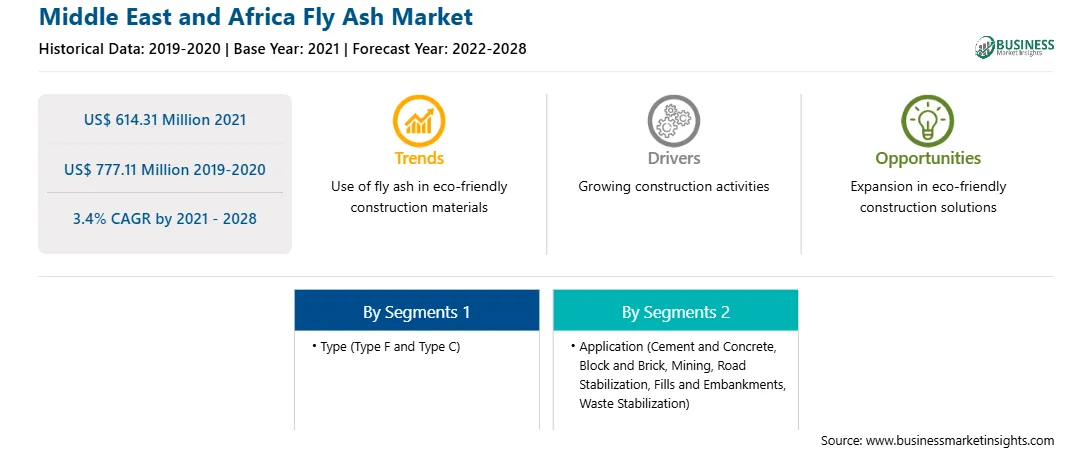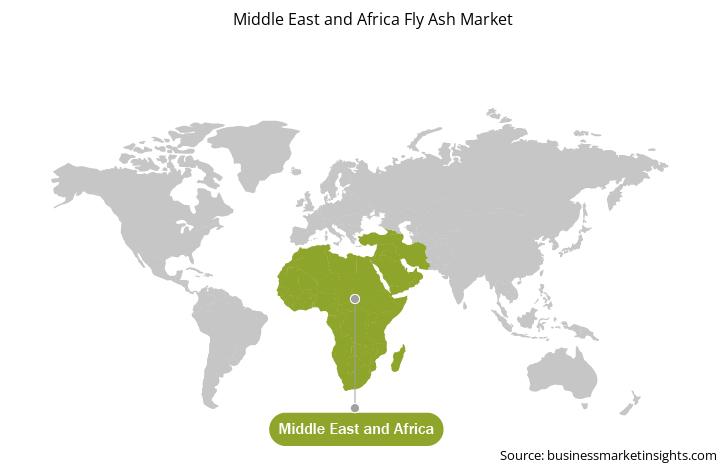Market Introduction
The fly ash market in Middle East and Africa is segmented into South Africa, Saudi Arabia, the UAE, Ghana, Jordan, Qatar, Kenya, Bahrain, Tanzania, Oman, and the rest of Middle East and Africa. The Middle East and Africa is one of the prominent energy markets across the world and a fertile region for global fly ash suppliers, transporters, and traders. The region is witnessing several structural and economic changes, with Egypt and Qatar dramatically increasing infrastructure, Saudi Arabia mapping out a statewide development strategy, and a rapidly expanding cement market in the UAE. The necessary infrastructure investments, particularly in electricity, water, health, and transportation, would boost the sustained and inclusive growth of the fly ash market in the Middle East and Africa during the forecast period. Furthermore, energy companies in the region intend to continue with infrastructure investment programs to increase the efficiency of the electricity sector. The programs involve recycling industrial waste, such as coal combustion products, and reutilizing them for several applications. This also helps reduce landfills and safeguard the environment, which is expected to boost the growth of the fly ash market across the region in the coming years. Governments and regulatory organizations across the Middle East and Africa are establishing plans to increase electricity supply due to the rising population and growing electricity consumption. This factor is also expected to boost the fly ash market across the Middle East and Africa in the coming years. However, the government is focusing on adopting renewable energy sources for electricity generation. This factor may impact the operations of coal-fired power plants in the region, which may hinder the fly ash market growth during the forecast period.
In the MEA region, South Africa and Israel are among the major countries with a high number of COVID-19 confirmed cases and deaths. The MEA region comprises many growing economies, which are prospective markets for fly ash vendors. The pandemic has significantly slowed down the growth of the fly ash market in the region. The construction industry in the region was facing many challenges, including delays in raw material, much fewer projects, and new restrictions on how laborers could operate on a construction site. The pandemic has disrupted various construction activities in the region. However, the various construction activities are expected to return, with many construction projects in the pipeline.
Strategic insights for the Middle East and Africa Fly Ash provides data-driven analysis of the industry landscape, including current trends, key players, and regional nuances. These insights offer actionable recommendations, enabling readers to differentiate themselves from competitors by identifying untapped segments or developing unique value propositions. Leveraging data analytics, these insights help industry players anticipate the market shifts, whether investors, manufacturers, or other stakeholders. A future-oriented perspective is essential, helping stakeholders anticipate market shifts and position themselves for long-term success in this dynamic region. Ultimately, effective strategic insights empower readers to make informed decisions that drive profitability and achieve their business objectives within the market. The geographic scope of the Middle East and Africa Fly Ash refers to the specific areas in which a business operates and competes. Understanding local distinctions, such as diverse consumer preferences (e.g., demand for specific plug types or battery backup durations), varying economic conditions, and regulatory environments, is crucial for tailoring strategies to specific markets. Businesses can expand their reach by identifying underserved areas or adapting their offerings to meet local demands. A clear market focus allows for more effective resource allocation, targeted marketing campaigns, and better positioning against local competitors, ultimately driving growth in those targeted areas.Middle East and Africa Fly Ash Strategic Insights

Middle East and Africa Fly Ash Report Scope
Report Attribute
Details
Market size in 2021
US$ 614.31 Million
Market Size by 2028
US$ 777.11 Million
Global CAGR (2021 - 2028)
3.4%
Historical Data
2019-2020
Forecast period
2022-2028
Segments Covered
By Type
By Application
Regions and Countries Covered
Middle East and Africa
Market leaders and key company profiles
Middle East and Africa Fly Ash Regional Insights

Market Overview and Dynamics
The MEA fly ash market is expected to grow from US$ 614.31 million in 2021 to US$ 777.11 million by 2028; it is estimated to grow at a CAGR of 3.4% from 2021 to 2028. Fly ash is used in various applications such as cement and concrete, block and brick, mining, fills and embankments, many others. Due to its pozzolanic feature, the use of fly ash in concrete is quite beneficial, as it improves concrete's durability. In the manufacturing of Portland cement concrete, fly ash is utilized as a supplementary cementitious material (SCM) to improve the performance of this concrete. Fly ash bricks are used as a building material in place of clay bricks. Compared to traditional clay bricks, fly ash bricks are lighter and more robust, are low-cost, do not require plaster, and can help reduce building expenses and soil erosion. Due to their high strength, lightweight, and sustainability, these bricks and blocks are rapidly replacing conventional clay bricks for the construction of residential and commercial buildings, in turn, boosting the demand for fly ash. Moreover, fly ash is used as filler and road embankment materials, due to its significant properties, such as shear strength, compressibility, and permeability. The governments of several countries are encouraging the use of fly ash for road embankments, propelling the market’s growth. Further, the increasing use of fly ash in other applications, such as soil stabilization and waste stabilization, is also driving the MEA fly ash market significantly.
Key Market Segments
In terms of type, the type C segment accounted for the largest share of the MEA fly ash market in 2020. In terms of application, the cement and concrete segment held a larger market share of the MEA fly ash market in 2020.
Major Sources and Companies Listed
A few major primary and secondary sources referred to for preparing this report on the MEA fly ash market are company websites, annual reports, financial reports, national government documents, and statistical database, among others. Major companies listed in the report are Aceton Industries, LLP; Ashtech India Pvt. Ltd; CEMEX S.A.B. DE C.V.; and HOLCIM among others.
Reasons to buy report
MEA Fly Ash Market Segmentation
MEA Fly Ash Market -
By Application
MEA Fly Ash Market - By Country
MEA Fly Ash Market - Company Profiles
The Middle East and Africa Fly Ash Market is valued at US$ 614.31 Million in 2021, it is projected to reach US$ 777.11 Million by 2028.
As per our report Middle East and Africa Fly Ash Market, the market size is valued at US$ 614.31 Million in 2021, projecting it to reach US$ 777.11 Million by 2028. This translates to a CAGR of approximately 3.4% during the forecast period.
The Middle East and Africa Fly Ash Market report typically cover these key segments-
The historic period, base year, and forecast period can vary slightly depending on the specific market research report. However, for the Middle East and Africa Fly Ash Market report:
The Middle East and Africa Fly Ash Market is populated by several key players, each contributing to its growth and innovation. Some of the major players include:
The Middle East and Africa Fly Ash Market report is valuable for diverse stakeholders, including:
Essentially, anyone involved in or considering involvement in the Middle East and Africa Fly Ash Market value chain can benefit from the information contained in a comprehensive market report.